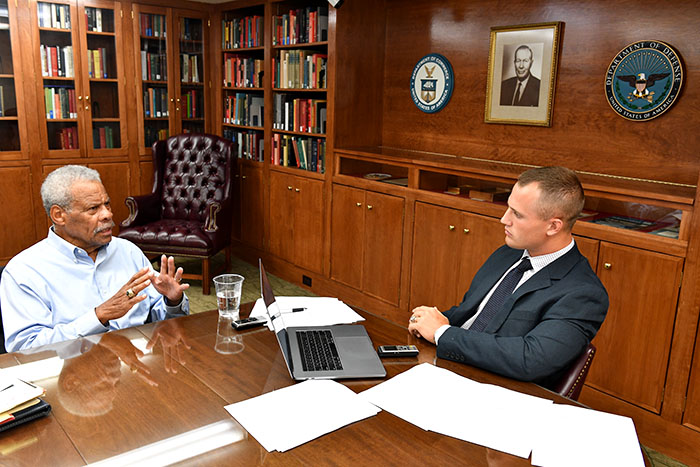Cadet Project Explores African-American Experience in Vietnam

Former VMI Sgt. Maj. Al Hockaday discusses his Vietnam War experiences with Max Gallahan '20.—VMI Photo by Mary Price.
LEXINGTON, Va., Oct. 8, 2019—This summer, Maxwell Gallahan ’20 hasn’t just been studying history. He’s been helping to create a historical record.
Gallahan, a history major who plans to commission into the Marine Corps, has been working on a project, “African-American Vietnam War Veterans and the Civil Rights Movement,” under the auspices of the Summer Undergraduate Research Institute.
Gallahan explained he’d first developed an interest in race relations and African culture because of the diversity of his friends at his hometown of Springfield, Virginia. At VMI, he took a historical methods class taught by Col. Brad Coleman ’95, professor of history, and wound up writing his final paper on the role of African-Americans in World War II. That assignment held his interest so well that he decided to keep going with it.
“Essentially, I’m just carrying that same narrative forward to a more important time in the African-American experience in the military,” said Gallahan.
The highlight of Gallahan’s summer research, which will form the basis for an honors thesis this academic year, was a two-hour interview with Al Hockaday, former sergeant major to the Corps of Cadets and a Vietnam veteran who took part in many marches and sit-ins during the long struggle for civil rights in the 1960s.
By the time Hockaday enlisted in the Marine Corps in 1960, all branches of the military had been desegregated for a dozen years, thanks to an executive order signed by President Harry S. Truman in 1948. Systemic racism, though, persisted, and when Hockaday completed basic training at Parris Island, South Carolina, he found himself assigned to the standard African-American billet of a cook.
Hockaday immediately challenged that assignment and was reassigned to the infantry, but not before being threatened with bodily dismemberment if his job performance wasn’t up to par.
Hockaday told Gallahan and Coleman, who is now Gallahan’s thesis advisor, that racism hadn’t been a big part of his experience in Vietnam.
“Every story he told was that it really didn’t affect him,” commented Gallahan. For Gallahan, Hockaday’s experience was surprising because it contradicted what he thought he knew.
Earlier this year, he’d been reading Bloods: Black Veterans of the Vietnam War by Wallace Terry, which paints a graphic and often vulgar picture of racial tensions among troops.
“It was a lot meaner than I thought it was … with the things that people would say to each other,” said Gallahan. “But then you have people like Sgt. Maj. Hockaday saying that wasn’t his experience.”
Coleman weighed in on that discrepancy, saying, “I think it speaks to the complexity of the human experience—the diversity of experience within the American armed forces.”
Coleman also noted that as a platoon sergeant in Vietnam, Hockaday had followed the example set by his own platoon leader at Parris Island, who had told his recruits, “There will be no racism in my platoon.”
Leading by example, Coleman explained, Hockaday followed suit. “He would not let [racism] happen with his men,” said Coleman. “He would not let the blacks go to one tent and the whites go to another tent.”
After being wounded in Vietnam in 1966, Hockaday found himself stateside the next year, this time stationed at Quantico, Virginia. There, he used the Marine Corps base’s proximity to Washington, D.C. to his advantage, traveling regularly to the nation’s capital to take part in civil rights protests—and meeting Dr. Martin Luther King Jr. in the process.
Gallahan said that Hockaday recalled King as “calm, cool, and collected.” Gallahan added, “I think that rubbed off on [Hockaday] a little bit because he’s exactly the same way.”
Going forward, Gallahan hopes to interview more African-American Vietnam War veterans. He’s also made a research trip to Quantico, home of the Marine Corps University and Marine Corps archives, where he was assisted by Brad Wineman ’99, a member of the faculty at the Marine Corps University.
And while Gallahan gleaned much material from the interview with Hockaday, Coleman pointed out that there is a much deeper value to unpacking Hockaday’s memories: soon, there will be a transcript and audio recording of the interview available to future historians.
“Oral histories are an important part of the way we capture, preserve, and perpetuate the human experience,” the history professor commented. “The work that Max did [July 18] with Sgt. Maj. Hockaday creates a narrative .. for posterity.”
– By Mary Price
.svg)
.png)